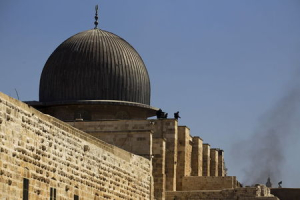Amid a wave of Israeli-Palestinian violence, the United Nations cultural heritage body UNESCO adopted a resolution on Wednesday condemning Israeli handling of Jerusalem's al-Aqsa mosque.
After last-minute changes, however, the resolution approved by UNESCO's executive board dropped a potentially more controversial clause laying claim to Jerusalem's Western Wall as a holy site for Muslims only, Israeli diplomats said.
That clause, which was proposed by several Muslim countries and would have stated that the Western Wall was an integral part of the al-Aqsa mosque compound, vanished after it was condemned by the Israeli government and Jews worldwide, and disowned as dangerous by UNESCO's own director general, Irina Bokova.
In its place, the resolution adopted on Wednesday said UNESCO (United Nations Educational, Scientific and Cultural Organisation) condemned restrictions of freedom of worship at the al Aqsa mosque and reaffirmed other complaints about Israeli management of holy sites.
UNESCO did not immediately provide a copy of the resolution adopted following protracted negotiations but Palestinian and Israeli diplomats provided matching accounts to reporters.
The news from UNESCO headquarters coincided with international endeavors to calm violence in which at least 42 Palestinians and eight Israelis have died. The turmoil as been triggered in part by what Palestinians regard as increased Jewish encroachment on the al-Aqsa compound.
The resolution was adopted with 26 votes in favor and six against, including the United States, Britain and Germany against. There were 25 abstentions including France, diplomats said.
Jerusalem's old city and walls are on a list of world heritage sites whose protection is one of the jobs entrusted to UNESCO.
Israel regards all Jerusalem, including the predominantly Arab east captured and annexed in 1967, as its "indivisible capital" - a claim not recognized internationally - and its right-wing government is wary of being portrayed as dividing the city.
Palestinians want the occupied West Bank and the Gaza Strip for a future state, with Arab East Jerusalem as its capital.
The UNESCO text, diplomats said, also reaffirmed that two holy sites, the Tomb of the Patriarchs in Hebron and Rachel's Tomb in Bethlehem, "are an integral part of Palestine".
The Palestinians won full membership of UNESCO in October 2011 in what was seen a major step forward for their efforts to achieve recognition as an independent state, despite intense opposition from both the Israeli government and Washington.

















